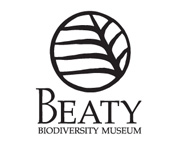Eyeball Adaptation: Dissection Demonstration
Chances are, you’re using your eyes to read this post. The eyeball is an amazing adaptation found in many animals all over the planet. Did you know that our eye has six muscles? They help you look up, down, left, right, circle both ways, and keep your field of vision straight when you tilt your head. Amazing!
You probably didn’t think you’d be helping to dissect an eye this week, but you can do just that by stopping by the daily activity featuring Extreme Eyes at the Beaty Biodiversity Museum. Our amazing volunteers will lead you through the parts of a sheep’s eye. Learn about blind spots, functions of eye parts, and some extreme eye adaptations in various animals. This is just one of the incredible activities we’re featuring over the year of extremes!
Where do the eyes we dissect come from? For this activity, we have eyes from sheep. While the rest of the sheep is used for food, the eyes are usually discarded. Examining real eyes is an exceptional way to understand this organ. We hope you find this unique opportunity as exciting as we do!
Extreme Adaptations
As humans, we are drawn to the extreme – the grotesque, exciting, adorable, implausible and incredible. Organisms on this earth are equipped with extreme adaptations, capable of achieving amazing feats, while inhabiting and surviving in the seemingly impossible.
The diversity of life encompass the unfathomably small and incredibly giant, along with everything in between. Size isn’t the only extreme: every organism on our planet is adapted to survive and exploit the world around it. There are extreme and fascinating examples from every branch on the tree of life. What are these extreme adaptations? How do they arise? How do we study them in extreme parts of the earth? At the museum, we will help satiate your extreme curiosity about the world around you.
Our new museum programming features:
- Museum Tours: let us guide you through extreme organisms throughout our collections
- Discovery Lab: learn about two extreme biodiversity researchers from UBC. How do they adapt to extreme environments to study extreme animals? Become a scientist and try out their research techniques.
- Crafts: make your own useful tools for your scientist kit (current research tool: Herbarium plant press)
- Extreme Eyes Activity: get up close to the eyeball, an extremely fascinating adaptation. This activity involves a dissection demonstration.
- Extreme Trivia: blow your mind with extremely cool facts about interesting organisms
- Puppet Show: meet the blue whale's biggest fan and help her discover other extreme organisms that might be her new favourite
- New scavenger hunts
- And more!
You can also join our sister attraction, UBC Botanical Garden, for a thrilling journey through the world of extreme plants. Though peaceful and tranquil on the surface, gardens are a place of mystery, intrigue, exploitation, and tremendous extremes. and discover how plants around the world have adapted to climb, defend themselves, attract animals for pollination, and survive extreme weather conditions.
For more information on Extreme Adaptations at the Beaty Biodiversity Museum, .



